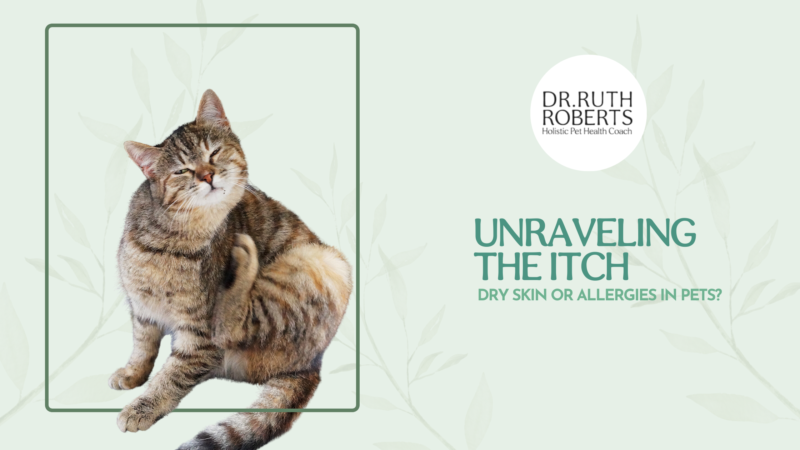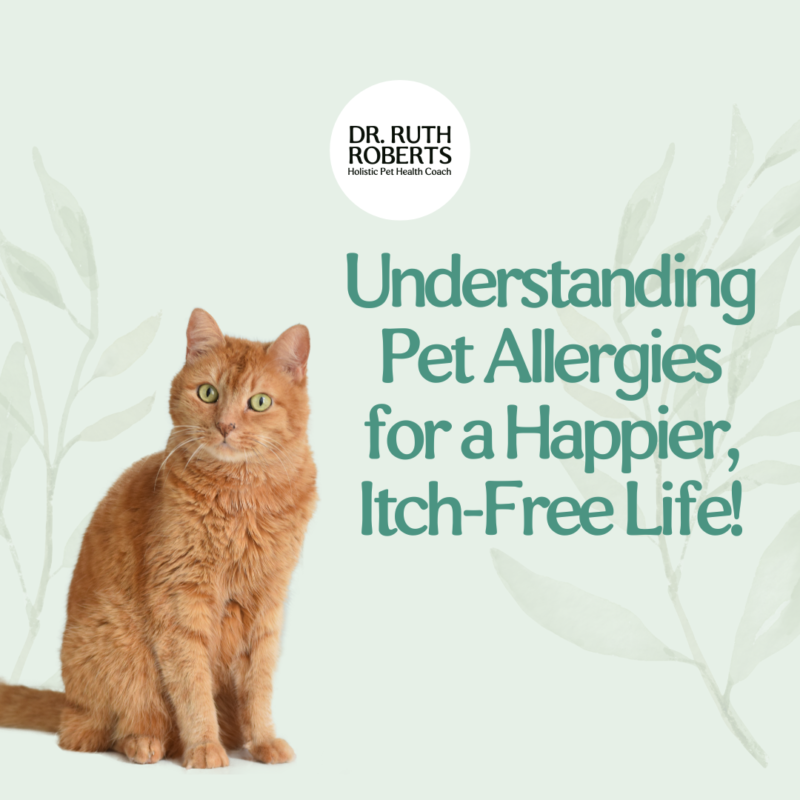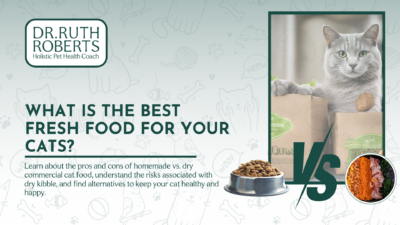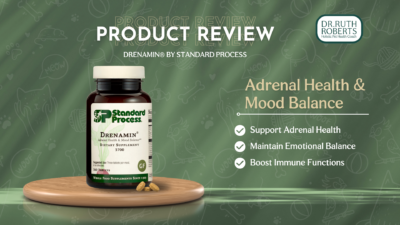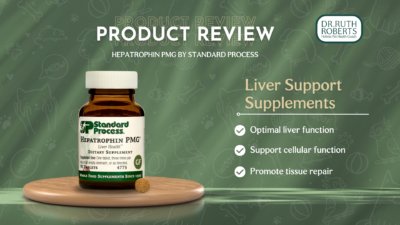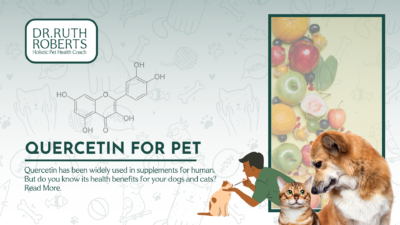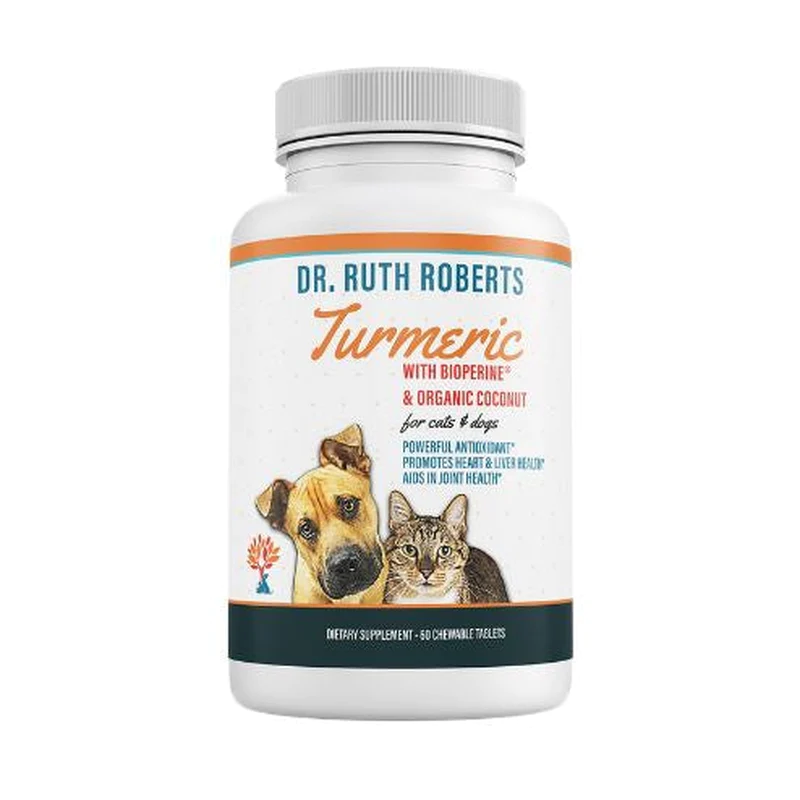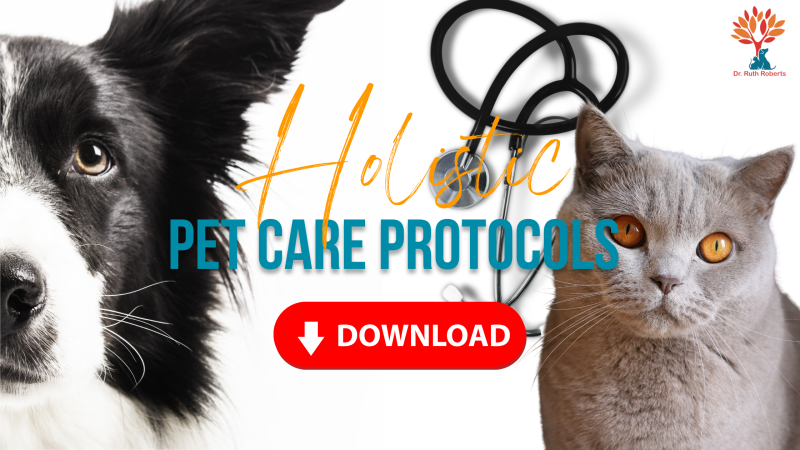Persistent Pet Itching
Is it Dry Skin or Allergies?
I am the Original Holistic Pet Health Coach, and am now training passionate pet parents, and pet professionals to be Certified Holistic Pet Health Coaches so that more pets can be helped holistically.
Persistent itching in pets can lead to discomfort and even affect their quality of life. Dry skin and allergies are two primary reasons behind this frustrating issue. Holistic pet health is a comprehensive approach that considers your pet’s physical, emotional, and environmental well-being to address such concerns effectively. Dry skin can result from various factors, including weather conditions and inadequate grooming, leading to a flaky and dull coat. Holistic pet health practices, such as using natural and organic grooming products and incorporating regular massage, can help improve your pet’s skin condition.
On the other hand, allergies occur when your pet’s immune system overreacts to certain substances, causing intense itching, red and inflamed skin, and possible secondary infections. Holistic pet health approaches emphasize a balanced and species-appropriate diet, which can play a crucial role in managing allergies. Incorporating hypoallergenic and organic food options, along with supplements to support their immune system, can be beneficial.
Identifying whether your pet’s itching is due to dry skin or allergies is crucial for appropriate holistic treatment. By following the practical steps provided in this blog post, such as using moisturizing pet shampoos, adding Omega-3 fatty acids to their diet, and seeking professional advice, you can take proactive measures to soothe your pet’s discomfort and promote their overall well-being. With a holistic approach to pet health, you can address the root cause of the itching and not just its symptoms. Your furry companion’s happiness and comfort are within reach with the right care and attention to holistic pet health practices.
Understanding Dry Skin in Pets
Dry skin is a prevalent condition that can affect dogs, cats, and other pets. Just like in humans, pet care for dry skin can occur due to various factors, including environmental elements, improper grooming, and underlying health issues. Pets with dry skin often display symptoms such as a flaky or dull coat, excessive shedding, and frequent scratching to alleviate discomfort. In more severe cases, the affected areas of their skin might appear red and inflamed. Addressing dry skin in pets involves regular bathing with moisturizing pet shampoos, providing dietary supplements like Omega-3 fatty acids to promote skin health, and maintaining proper humidity levels in dry climates with the use of humidifiers.
Pet cares for dry skin are essential to ensure your furry companion’s comfort and overall well-being. By incorporating these pet care practices into your routine, you can help alleviate dry skin issues and keep your beloved pets happy and healthy.
Common symptoms of dry skin in pets include:
- Flaky or Dull Coat: If you notice your pet’s coat has lost its luster and appears flaky, it might be a sign of dry skin.
- Excessive Shedding: Dry skin can lead to excessive shedding, leaving a trail of fur around the house.
- Itching and Scratching: Pets with dry skin tend to scratch more frequently to alleviate the discomfort, leading to further irritation.
- Redness and Inflammation: Dry skin can cause red, inflamed areas on your pet’s skin, especially in more severe cases.
Addressing Dry Skin
To help your pet with dry skin, consider the following measures:
Use a moisturizing pet shampoo to keep your pet’s skin hydrated. Avoid over-bathing, as it can strip the skin of natural oils.
Consult your veterinarian about adding Omega-3 fatty acids to your pet’s diet, which can help improve skin health.
If you live in a dry climate, consider using a humidifier to add moisture to the air inside your home.
Understanding Pet Allergies
Pet allergies, just like in humans, occur when the immune system reacts to certain substances, known as allergens. Common allergens include pollen, dust mites, mold spores, and certain foods.
Just like humans, pets can experience allergies triggered by various allergens such as pollen, dust mites, mold spores, and certain foods. Allergic reactions in pets often manifest as skin problems, leading to intense itching, inflamed and irritated skin, and excessive licking or chewing of affected areas.
Allergic pets may also develop secondary skin infections due to persistent scratching. Identifying the specific allergen can be challenging, but a veterinarian’s guidance is essential for proper diagnosis and treatment. Allergy management approaches may include an elimination diet to identify food allergies, prescribed medications like antihistamines or corticosteroids to manage symptoms, and allergen avoidance to minimize exposure. By understanding and addressing pet allergies, we can help our furry friends find relief from incessant itching and lead a happier, healthier life.
Allergic reactions in pets often manifest as skin problems, and the symptoms can include:
- Intense Itching: Unlike occasional scratching due to dry skin, allergic pets might experience constant, severe itching.
- Inflamed and Irritated Skin: Allergic reactions can lead to red, swollen, and irritated skin, particularly around the ears, paws, and belly.
- Excessive Licking and Chewing: Pets may excessively lick, bite, or chew at their paws or other body parts affected by the allergen.
- Secondary Infections: Persistent scratching can break the skin barrier, leading to secondary infections that require veterinary attention.
Addressing Pet Allergies
If you suspect your pet has allergies, it’s crucial to consult your veterinarian for proper diagnosis and treatment. Some common approaches include:
- Elimination Diet: Your vet may recommend an elimination diet, along with pet supplements, to identify potential food allergies and improve overall nutrition.
- Medication: In some cases, antihistamines or corticosteroids may be prescribed, along with pet supplements, to manage allergy symptoms and support your pet’s immune system.
- Allergen Avoidance: If the allergen is identified, minimizing exposure, along with pet supplements, can significantly help alleviate symptoms and improve your pet’s holistic health.
By incorporating pet supplements into your pet’s treatment plan, you can provide additional support for their immune system, skin health, and overall well-being. Always follow your veterinarian’s advice and ensure you are using high-quality, safe, and effective pet supplements to enhance the care and comfort of your furry companion.
Conclusion
Whether your pet is experiencing dry skin or allergies, identifying the cause of their persistent itching is the first step towards providing them with relief. Regular grooming, a balanced diet, and a healthy living environment are essential for maintaining your pet’s skin health. If the itching persists or worsens, always seek professional advice from your veterinarian to ensure your pet’s well-being and happiness.

